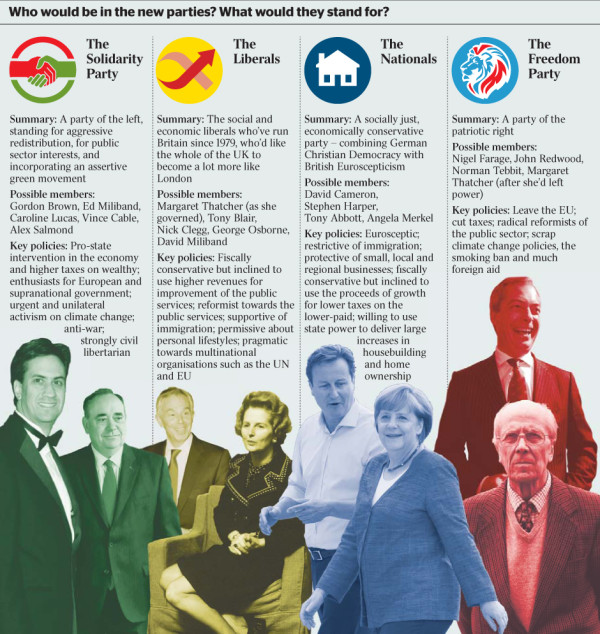This summary/graphic by Tim Montgomerie of The Times is fun. It imagines the four parties Britain would have if we started from scratch. If we did do such an experiment with voters—if we asked them about real policy choices—I don’t believe that these are the clusters would emerge; most people, especially English people, believe hotchpotches of things that, taken together, have little ideological coherence. It tends to be politics geeks and media commentators who a) can recognize an overarching political philosophy when they see it and b) think politicians should have one. Real people care about getting their bins emptied and worry less about the details of how or why.
Personally, I’d be a (practical rather than ideological) “(New )Liberal”—except for the bit about wanting the country to be more like London. The summary claims that the people running the country recently have mostly been New Liberals. But most of the parties’ current leaders are behaving as HotchPotchers, even if they aren’t HotchPotchers in their hearts. Since most of the parties are currently led by people who’ve done little in their adult lives other than study or practise politics, this is either strange—surely people who care so much about ideology would want one of their own?—or not strange—if your livelihood depends on persuading an electorate of HotchPotchers, that’s what you’re going to try to do and (appear to) be, regardless of your intellectual tastes.
Gratuitous YouTube video:


It’s an interesting idea. I find it weird that a right-nationalist party has so few policies which reflect the nationalist side of things, I’d throw in anti-immigration, authoritarian on law and order and what such movements would call “the defence of traditional [insert nation or racial group here] values” which usually translates to conservative social authoritarianism.
Interesting Cameron’s been placed in “The Nationals”; I’d say his personal ideology, and certainly the one he espoused whilst in opposition, was closer to “The Liberal”. He’s moved to the right in government a bit but I think that’s a reaction to UKIP and his fear of his own party’s rightwing than personal convictions.
“Personally, I’d be a (practical rather than ideological) “(New )Liberal”—except for the bit about wanting the country to be more like London.”
I think I’d be largely the same (I’d prefer a Solidarity-Liberal coalition but I’m probably getting ahead of myself), although I don’t think ideology and pragmatism are alien to each other. It’s possible to be ideological and to know when to push for a good idea and when to hold back or work with other ideologies for the good of democracy, or long term over short term goals or whatever. Without ideology, politicans can end up as George Monck figures who simply throw their lot in with whoever or whatever seems to be on the rise.
[…] now to my final link of the day. This, on Tim Montgomerie’s recent op-ed (in the paywalled Times I think) describes how our body […]
The subtle framing is impressive – DC would be part of a party that is ‘socially just’, whereas EM stands for ‘aggressive redistribution’…
Good point, well made, Ben.
If we’d started again, from the de Montfort model, we’d probably be wise enough to allow dominant political parties to form in the first place, instead having a collection of individuals representing other individuals, like a parliament should be.